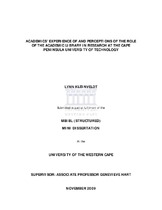Academics' experience of and perceptions of the role of the academic library in research at the Cape Peninsula University of Technology
Abstract
The study investigates the role of CPUT libraries in supporting research and how academics perceive this role. CPUT is a new university of technology and aims at improving its research record. Research is crucial to South Africa to develop economically, socially and to compete globally. Research is fundamental to the existence of universities. Universities of technology libraries face the challenge of providing support for research.
Previously the colleges / technikon libraries provided support for undergraduate and underdiplomates only. Today, they have to provide support for researchers at masters, doctoral, and post-doctoral levels.
Questions arising from the research problem are:
• How much and what kind of research is being conducted by academic staff at CPUT?
• What programmes does the library have to meet the needs of the researcher?
• How do academic researchers use the library at present?
• What do researchers see as the inhibiting and encouraging factors for their research
with regard to library services?
• How do they perceive the role of the library in their research?
There were two phases in the research design: an in-depth interview with the recently appointed Research Librarian at CPUT libraries whose job it is to plan and implement library support services to researchers and to run the Research Information Support Centre (RISC) and an electronic survey of researchers on the academic staff of CPUT. The purpose of the interview was to explore the library plans for research support. Nine themes were highlighted during the interview with the Research Librarian for example:
• Librarians should be researchers, research support is a whole-library responsibility
• Postgraduate degree research is the core function of RISC.
The purpose of the survey was to investigate what researchers need and want from the library as well as their perceptions and attitudes towards the role of the library in research. A questionnaire consisting of mixed questions (qualitative and quantitative) was sent by email to all 602 academics at CPUT across eight campuses. The aim was to achieve a representative sample across all six faculties. The final sample was 102 with one faculty underrepresented.
The study made the following findings:
• 52% of respondents strongly agree that research is essential to their job and that
CPUT needs to build a stronger research culture.
• PhD and Masters degree research dominates.
• For a University of Technology the low proportion of industrial-sponsored research is
perhaps surprising.
• The average time percentage spent in a working year on research is 23.4%. Several
comments in the final open-ended question point to heavy workloads.
• 65% of respondents have not published any articles in accredited journals in the past
three years.
• 57% of respondents do not agree that they source information directly from the
Internet and so no longer need the library.
• Most respondents, 95 of the 102, make use of the library for research support. However, RISC is not their number one choice for research support. RISC is perhaps underused. The three library services being extensively used by respondents are eresources, borrowing print resources and Inter-library loan services. Quite a high number of respondents, 27 (28%), are undecided whether the Digital Knowledge Repository at CPUT, a library project, is important to them. However, comments in the final open-ended question indicated that respondents are unaware of this service.
• The number one on researchers’ wish lists for library research support services is to be kept informed of new research in their field – thus the traditional current awareness services of libraries.
• The ICT infrastructure has been highlighted as critical. The main reason for low rating of the library is that the network / databases are too slow.
• There seems to be fairly strong doubt that librarians have adequate subject
knowledge to support research with 27% agreeing that librarians lack subject
knowledge.
• The cross tabulations suggest that there might well be some differences among faculties in terms of responses. But statistical tests of significance would be needed to confirm this suggestion.
The study had a few limitations. The survey left the researcher with some questions. It only focused on one institution. Postgraduate students who are not staff members were excluded from this study.
Some of the recommendations coming from the study are:
• ICT infrastructure needs to be improved
• Library current awareness and alerting services must be improved
• The Digital Knowledge research repository must be made more visible to academics
• Document delivery and inter-library loan services should be made more efficient and faster
• Collection development processes need to be geared more closely to the needs of researchers.
The aim of the project was to gather information for CPUT libraries to develop further their services to form a part of the research culture. The study might make academics and researchers aware of the potential role the library plays in contributing to their research needs. If South Africa is to progress to a knowledge society, its universities will have to increase research output. Universities of Technology have a particularly important role to play as South Africa urgently needs scientific and technological research. Therefore their
libraries have a special responsibility to support their efforts to improve their research culture and production. It is hoped that this study will contribute some insight into how University of Technologylibraries might enhance their research support.

